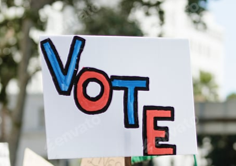When Information Becomes ‘Persuasion’:
School districts use public funds to push bond issues and tax hikes
On March 30, just two days before the April 1, 2025 election in Illinois, Phyllis Schlafly Eagles Executive Director, Kurt Prenzler, received a text message from a friend who lives in the Triad School District in the city of Troy. The message included two photos showing the front and back of a postcard “paid for by the Triad School District” in support of a $99.2 million bond issue that was on the ballot.
The nearly-impossible-to-read fine print asserted that the postcard was “not intended to advocate,” but the information provided was clearly one-sided. After the bond issue passed, a taxpayer filed a lawsuit alleging that the postcard and associated videos were biased, and were indeed advocacy, and therefore electioneering using taxpayer funds in violation of Illinois law. The lawsuit asks the court to enjoin the district from issuing the bonds.
 In recent years, public school districts across the country often spend taxpayer money on “outreach” that looks very much like political campaigning: glossy postcards, targeted social-media posts, professionally produced videos, polling, and mailers designed to persuade voters to approve bond measures and tax increases. These districts insist their efforts are neutral and “informational,” meant to educate the public about school district needs and the consequences of failing to meet them. But residents and watchdogs argue that the content is often one-sided and functions as paid advocacy.
In recent years, public school districts across the country often spend taxpayer money on “outreach” that looks very much like political campaigning: glossy postcards, targeted social-media posts, professionally produced videos, polling, and mailers designed to persuade voters to approve bond measures and tax increases. These districts insist their efforts are neutral and “informational,” meant to educate the public about school district needs and the consequences of failing to meet them. But residents and watchdogs argue that the content is often one-sided and functions as paid advocacy.
Numerous examples exist. Last year, the Houston Independent School District spent at least $1.48 million to promote a $4.4 billion bond issue, which 58 percent of the voters rejected on November 5. The citizens of Houston discovered the promotional advertising in advance of the election, and complained to Texas Attorney General Ken Paxton. Paxton’s office wrote a letter to the district asking questions, also in advance of the election. The publicity likely helped defeat the bond issue.
Citizens often have no idea what is happening until a one-sided postcard from the district shows up in their mailbox a week before an election. The bond issue or tax increase then passes, and no one has the energy or inclination to contest the results. As the old saying goes, “you can’t fight city hall,” and people generally think that is also true with public school districts.
But citizens are beginning to fight back, with the help of sympathetic prosecutors.
One week after the Triad School District bond issue passed, on the other side of the Mississippi River in St. Louis County (pop. 1.1 million), Proposition B appeared before voters on the April 8 election ballot. The county spent taxpayer money to print and mail “informational” postcards explaining why the proposition was bad. It would have given the county council the right to fire county government department heads. The measure failed. A concerned citizen complained to the county prosecutor, but due to a conflict of interest, the case went to the Missouri Attorney General, Andrew Bailey.
As in most states, Missouri law forbids an elected official to spend public funds to campaign for or against a ballot measure. St. Louis County Executive, Sam Page, was charged with two misdemeanor election offenses and two counts of felony theft “by deceit” as a result of his use of county money to defeat Proposition B.
The whistle blower in the St. Louis County case is Tom Sullivan, a long-time local government watchdog. In an interview, Sullivan recalled a prior instance when a tax district in the St. Louis area did not properly identify contributions in the amount of $175,000 that were used to promote a tax increase. He blew the whistle on the misuse of funds. The Missouri Ethics Commission agreed with Sullivan, but fined the taxing district only $100. As Sullivan observed, this was like “giving a parking ticket to bank robbers.”
Sullivan admits the charges brought against Page by Missouri Attorney General Andrew Bailey are stiff, but he says: “At some point courts have to put a stop to government officials campaigning with taxpayer money. In my experience, school districts are the champs at this game.”
As for the Triad School District case in Illinois, a hearing is scheduled for September 5, and Education Reporter will update readers of any new developments.
Want to be notified of new
Education Reporter content?
Your information will NOT be sold or shared and will ONLY be used to notify you of new content.
Click Here
Return to Home Page
